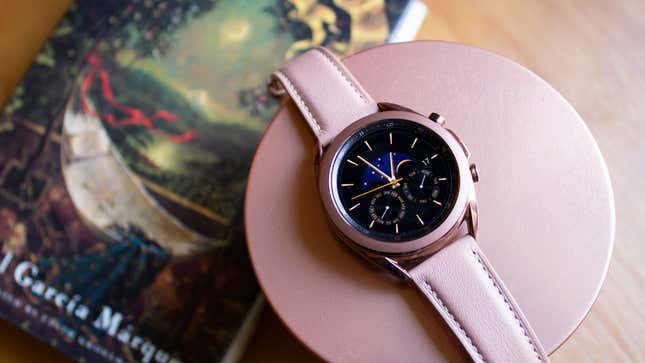
Rumors that Samsung may potentially ditch Tizen, its proprietary OS for wearables, for Google’s Wear OS, have been flying lately. It’s a baffling idea, considering that Samsung smartwatches are the best Android-friendly smartwatches right now, and Wear OS is a stinking hot mess.
Case in point: 9to5Google reports that the “OK Google” or “Hey Google” phrases to trigger Google Assistant on Wear OS watches have been broken for months. Google also confirmed to The Verge that it was aware of this bug, which has been plaguing users since at least November 2020, and is working on a fix. While you can still use the Assistant by long-pressing buttons (which is actually my preferred method of bringing up Assistant on Wear OS), it’s telling that Google has known about the problem for this long and still hasn’t fixed the issue.
Wear OS has long been one of Google’s most neglected projects, but this is a new low. The main reason to pick a Wear OS watch over a Fitbit or Samsung smartwatch is native integration with Google Assistant and Google Pay. If you don’t care about quickly fixing one of the main selling points of your wearables platform, then I’m not sure I can confidently say Wear OS is going to be around for the long haul. And this isn’t the only instance. Back in October, even Google put Wear OS second by opting to release a YouTube Music app for the Apple Watch first. Worse yet, Google’s most recent updates to Wear OS were paltry at best, with slightly better app loading times and a weather tile as the marquee features.
This was all Wear OS had to offer in 2020. Compare that to Samsung’s blockbuster year, in which it absolutely knocked it out of the park with the Galaxy Watch 3. Right now, the Galaxy Watch 3 is the only other flagship smartwatch that can go toe-to-toe with the Apple Watch on nearly every single feature. Of course, it’s not perfect. Some features like its FDA-cleared electrocardiogram app are currently only available for Samsung smartphone owners. However, there’s really no competition between the Galaxy Watch 3 and even the best of the best Wear OS watches I’ve tested.
To be fair, once upon a time Samsung did use Wear OS—then Android Wear—on its smartwatches. But in 2014, it made the switch to Tizen with the Gear 2 and Gear 2 Neo, probably for the same reasons nearly every other smartwatch maker besides Fossil at the time did: Google’s clunky UI, low adoption rate, and the outdated Qualcomm Snapdragon Wear 2100 chip.
So why, why would Samsung go back to a platform that has yet to get its shit together? I can think of a few reasons, but none of them are particularly good. For starters, Tizen doesn’t have a great ecosystem of third-party apps, and switching to Wear OS might open it up to more apps. But to be quite honest, Wear OS apps don’t get much developer love, even if there are more of them. For instance, Spotify for Wear OS is a glorified remote control, while Spotify for Tizen lets you use offline playlists. Google’s native Wear OS apps are OK at best, and frankly, it’s bizarre that the built-in Google Fit workout app is actually now split into several different versions. Google Fit, even with newer updates, is also not better than Samsung Health, and having both installed on your watch is again, tedious.
The other reason I could see Samsung making the switch would be to bring the option of Google Assistant and Google Pay to Samsung watches. And that would be awesome, because Samsung Pay is more restrictive to use than Google Pay, and who the hell actually likes Bixby? But does Samsung need to go all-in on Wear OS to incorporate Assistant and Google Pay? Fitbit manages to have Google Assistant work on Fitbit OS, why not allow Samsung to do the same? (Granted, Fitbit likely has Assistant because Google now owns the company.)
There’s the distinct chance that a Samsung Wear OS watch would suck less than every other Wear OS watch. But that’s mostly because Samsung could use its proprietary Exynos SoC instead of relying on Qualcomm’s, which is doing the bare minimum. Also, while I’m sure Samsung’s rotating bezel navigation could be ported onto a Wear OS watch, it just wouldn’t be quite as good unless Google allowed Samsung to run a Wear OS skin (which is what Oppo did with its Wear OS watch). It’s telling that Wear OS was actually decent on the Oppo Watch because it didn’t look or function anything like Wear OS. And at that point, what even is the reason to switch from Tizen again?
It’s clear that Google gets more out of Samsung using Wear OS than vice versa. Samsung bringing its smartwatch innovations to that platform would suddenly make it relevant again—provided that all of Samsung’s apps, including the ones that need FDA clearance, could seamlessly make the jump.
Except that wouldn’t make Wear OS as a whole good. For that to happen, other watchmakers would have to figure out how to make the best use of Wear OS. Google would have to actually update the damn platform consistently with actually good features, not incremental ones that are barely a blip on the radar. Qualcomm would have to figure out how to update its wearable SoC to current process technology and do it more than once every two years. And that’s if Google doesn’t decide to up-end the whole thing now that it owns Fitbit to make something else entirely.
Android users—and not just the ones who use Samsung smartphones—deserve an excellent smartwatch. This just doesn’t seem like the best way to get one.